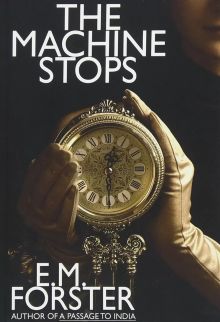The machine stutters
Micropayment rears its confused head again

The cover of an unidentified edition of The Machine Stops
ELON MUSK, proprietor of Twitter, announced on 29 April 2023 that the microblogging site would in May "allow media publishers to charge users on a per article basis with one click". This, not unexpectedly, drew a sceptical response - perhaps somewhat tempered by the announcement being made at 09:31 Pacific Time. At this time many billionaires are, we gather, sober.
The idea of such "micropayments" is in fact older than the World-Wide Web. In 1965 Ted Nelson published a proposal for Project Xanadu. In this global hypertext authors would publish much as we can on the World-Wide Web; but when we quoted other authors, the quoted text would be inserted directly from their sites. Thus Xanadu would meet Rule 1 of sound relational database design:
Rule 1: The information rule: All information in a relational data base is represented explicitly at the logical level and in exactly one way - by values in tables.
In plainer English, each piece of information would appear in one place only (bar backups).
Also, in Nelson's design, the estate of Edgar Codd could be entitled to payment for my use of the above extract of his work.
Xanadu never got built. The programming was fairly difficult, and so is Nelson, a man of mercurial enthusiasms. (He declared the present author his representative to the UK when we met, but nothing more was heard of this.)
Xanadu did, though, inspire the easy-to-program World Wide Web version 0 in 1990. It was first conceived as an internal information system for the CERN laboratories, in which everything posted was assumed to be freely available to everyone with access to it. It still offers no automated linking back to sources and no automated recognition of authorship. Robert Cailliau, Tim Berners-Lee's collaborator in this, generally conceded when asked that this was non-optimal.
It remains to be seem what becomes of Musk's latest (at the time of writing) enthusiasm. But that idea that an author or their publisher should be able to collect a few pennies from each reader of their work seems to keep coming back.
It is even, perhaps, hinted at in E M Forster's short story The Machine Stops, which prefigured all this in 1909:
"The Machine," they exclaimed, "feeds us and clothes us and houses us; through it we speak to one another, through it we see one another, in it we have our being. The Machine is the friend of ideas and the enemy of superstition: the Machine is omnipotent, eternal; blessed is the Machine."
On second thoughts, do not follow the above link: Morgan ("E M") Forster lived to the age of 91, dying in 1970, so in the UK his works are in copyright until the end of 2040. Follow this link to Penguin Books.
We shall for the moment skate over all the arguments about whether micropayment is a good idea. So much, these days, is drowned out by the cries of the overgrown squeaky teenagers who want it all, for free, now - see the responses to Musk's Tweet if you are feeling masochistic.
- Afterthought 06/05/23: how would Xanadu handle the "exceptions" to copyright - such as that permitting quoting short extracts for the purpose of reporting news and current events, on which we rely in reproducing these? It would be in the spirit of the proposal for the quoter simply to declare (in machine-readable form) that they were relying on this or an equivalent exception: false declarations would be easily traceable.
![[Freelance]](../gif/fl3H.png)